NEWS
【Interview with Head Coach IKEDA Futoshi】”The experience of fighting under a unique tension was priceless” - FIFA U-20 Women's World Cup Costa Rica 2022™
12 September 2022
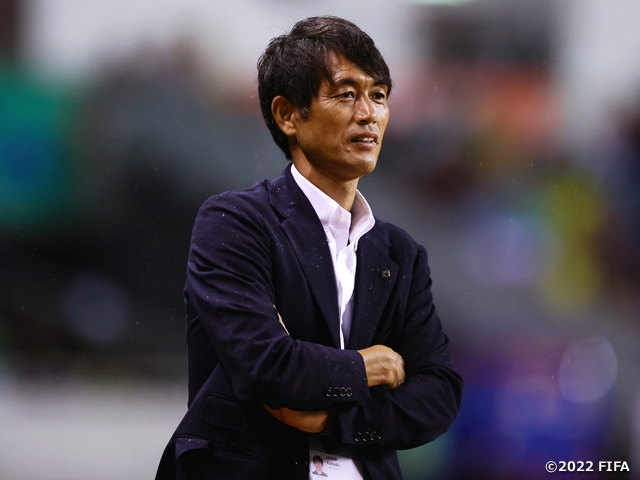
The FIFA U-20 Women's World Cup Costa Rica 2022™ was held from 10 to 28 August, during which the U-20 Japan Women's National Team finished in second place. Despite falling short of winning back-to-back titles for the first time in the tournament's history, the team won their third consecutive Fair Play Award and received strong support from the local community. Here we interviewed Head Coach IKEDA Futoshi about the fulfilling time he and his team spent in Costa Rica
――You reached the final for the second tournament in a row and finished as the runners-up. First of all, what are your thoughts on the tournament as a whole?
First of all, I would like to thank all the people who have been involved with the players, including their teams, their coaches who have supported them since they were small children, and their parents. Looking back at the tournament, it was evident that countries were putting their resources and efforts to raise the quality of their teams, even at this age group, and we saw many talented players at each position. I think the players' understanding of how to deal with such opponents and their ability to adapt in a short time was one of the strengths of this team.
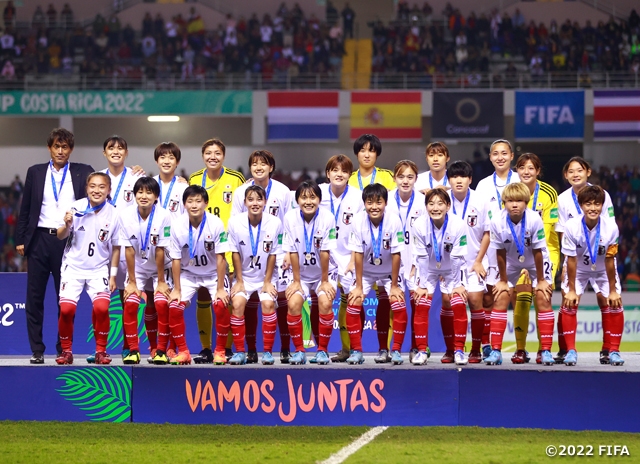
――The Asian qualifiers were cancelled and your team was unable to travel abroad in the lead-up to this tournament. What was your emphasis in building the team?
During our training sessions, we divided the pitch into several zones to organise our offensive and defensive aims and worked out the details based on the scouting reports of our opponents. Because we were not able to play any international matches prior to the tournament, we tried out various systems, as other countries would have no way of knowing what kind of team Japan would be like. In doing so, it was also intended to broaden the range of play and styles of our players.
――It seemed like your approach was effective in your team’s first match against the Netherlands.
Yes, that's right. We had been playing with the concept of "fighting aggressively," so we went into the first match determined to showcase everything we had built up. Despite looking stiff in our first match, we were able to execute our gameplan and score the opening goal. Our opponents started to play more long balls in the second half, which we had to endure for a while, but we fought tenaciously and managed to pick up three points, which gave us a lot of confidence.
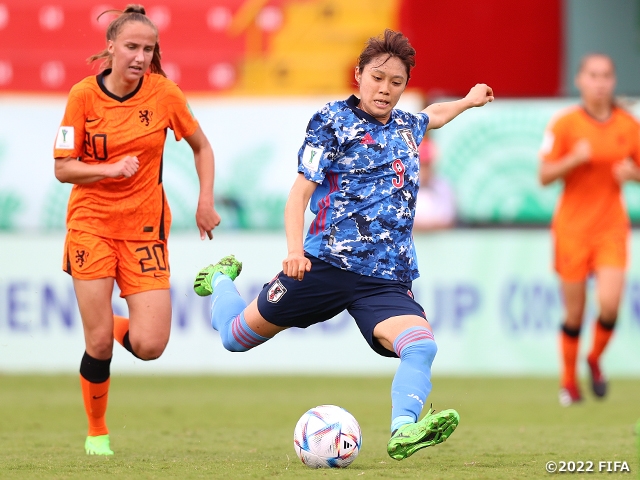
――Is there anything special you have done to inform your players about their opponents?
With only two days in between matches, the staff and I often discussed when to share the opponent's information with the players and how to build our training sessions based on this information. We tried not to overwhelm them with excessive information, but I think our players were exceptionally good at processing information.
――Even after the subsequent victory over Ghana, the team had not clinched a place in the knockout stage, which made the third match against the USA a tense affair. What was the key factor in this match?
The USA had a good passer in their defence line, so we tried to keep ourselves compact in the first half but couldn't apply as much pressure as we would have liked. That is why we re-installed a defensive shift from the frontline to prevent them from sending long balls. I think it was huge that we were able to regain our aggressiveness and take the lead in that situation.
――We heard that the “players-only” meeting held before the knockout stage was suggested by you.
That is correct. We would have to go home once we lose in the knockout stage, so I had a discussion with the team captain, NAGAE Ibuki, regarding this meeting. She told me later that they were able to spend a great time, where they all shared their thoughts with each other, including those who had limited playing time. I think during this process, they were able to further build on their teamwork.
――In your match against France, despite conceding the lead in the second half of overtime, you managed to equalise in your final play and win the match in penalties.
To be honest, we really wanted to finish the match in 90 minutes, but the players fought extremely hard against a very talented French side. The players looked very good when we huddled up before the shootout, and their hard work allowed us to play six matches in this tournament.
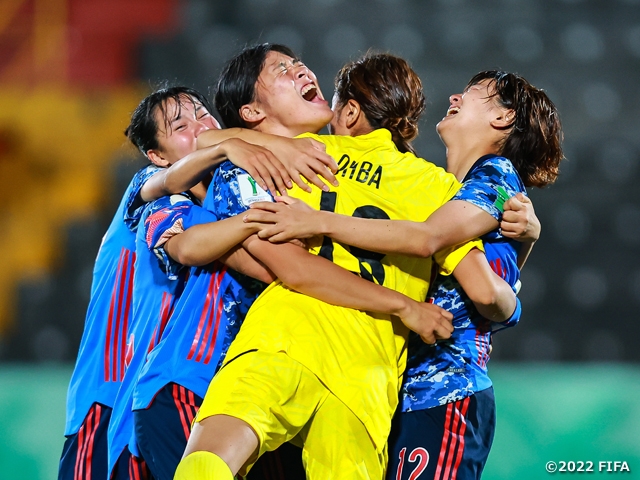
――Japan scored two goals against Brazil, who had not conceded a single goal until the semi-finals, and won the match to face Spain in the final for the second time in a row.
We were getting the impression that Brazil had strong players in each of their positions, and as we tried to keep the ball moving, YAMAMOTO Yuzuki scored the opening goal. Despite conceding the equaliser, our strong determination to reach the final led us to that victory.
――The team lost to Spain 1-3, but created lots of close opportunities in the second half.
Even before we got to settle in, our opponents exploited the space behind our defence line, which led to the three goals. We were definitely rattled by those goals, but we were still creating chances, so during halftime, I showed the players some of the footages from the first half and told them to stay aggressive. The players kept their heads up to score back a goal but fell short from levelling the score. The players looked very disappointed after the match, but some have told me that they had “lots of fun” too. We could feel the number of spectators and Japanese flags increasing with each match and the sound of the applause getting louder and louder, and we were grateful to have played in such a wonderful environment. It was frustrating at the end, but we fought through six incredible matches and spent a really intense month.
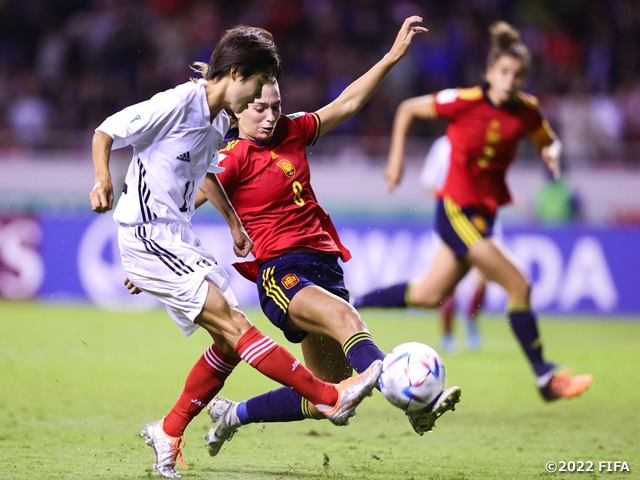
――One of the team's goals was to “become a team that gets cheered on.”
I think the players were being cheered on not only because of their lively attitude on the pitch and their strong determination to win the ball, but also their smiles and behaviour off the pitch. I felt that our players all shared a positive trait where they actively communicated with hotel staff and behave in a cheerful manner.
――How do you want the players to use the experience gained through this tournament in the future?
The experience of fighting under the unique tension of the final is something to be treasured. I hope they will make the most of the things they felt at the final and continue to work on their abilities to become a better player, which will ultimately thicken and broaden the foundation of women’s football in Japan. We would like to thank all the teams who provided their players, all the coaches who have been involved with the players and all those who have supported us. We look forward to your continued support.
Related News
-
National Teams
2022/09/02
U-20 Japan Women's National Team hold press conference after returning from the FIFA U-20 Women's World Cup Costa Rica 2022™

-
National Teams
2022/08/29
【Match Report】U-20 Japan Women's National Team finish second after losing to Spain in final

-
National Teams
2022/08/28
U-20 Japan Women's National Team about to step onto the stage of the World Cup Final

-
National Teams
2022/08/26
【Match Report】U-20 Japan Women's National Team defeat Brazil to get one step away from making history

Latest News
-
National Teams
2026/02/19
U-20 Japan Women's National Team short-listed squad & schedule - Training Camp (2/23-26@JFA YUME Field)

-
National Teams
2026/02/19
Japan Beach Soccer National Team short-listed squad & schedule - Training Camp (2/26-3/2@Okinawa)

-
National Teams
2026/02/12
U-17 Japan National Team squad & schedule - Prayer for Peace; Hiroshima International Youth Soccer Games 2025 (2/17-23@Hiroshima)

-
National Teams
2026/02/12
Nadeshiko Japan (Japan Women's National Team) squad & schedule - AFC Women's Asian Cup™ Australia 2026 (2/23-3/22)

-
National Teams
2026/02/09
U-16 Japan Women's National Team short-listed squad & schedule - Training Camp (2/16-19@Okayama)



